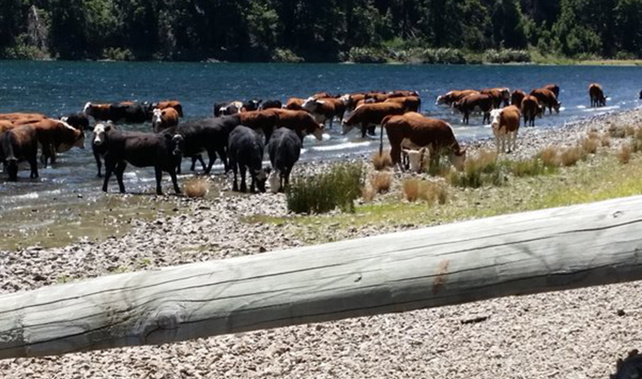
A herd of cattle photographed drinking out of a North Canterbury lake belong to Chief Justice Dame Sian Elias and her husband, the high profile businessman Hugh Fletcher.
The photograph, showing the herd wading and drinking from Lake Taylor, emerged on Twitter, and was snapped by a holiday maker. The site is also a popular Department of Conservation camping ground.
NZME understands the beef cattle came from Lakes Station, which is owned by Dame Sian and her husband Mr Fletcher.
The photograph sparked a war of words between Canterbury's Federated Farmers and Fish and Game.
Federated Farmers North Canterbury president Frank Brenmuhl said the situation isn't ideal, but the environmental effects would probably be minimal.
"It's not ideal but what we're looking at here as far as I can tell is high country cattle drinking in a high country lake," he said.
"It's not common, the stocking rate is very low, the impact is also very low."
It was a limited number of cattle, which are hard to fence and control, Mr Brenmuhl said.
But Fish and Game communications manager Don Rood told Newstalk ZB that's not the case.
The comments made by Federated Farmers were irresponsible, Mr Rood said, and the situation is actually a big deal to locals.
The person behind the photograph is laying a complaint with Environment Canterbury.
Mr Rood said Fish and Game would also want to take the matter further.
The organisation posted its disgust to Twitter, saying: "Is this good enough? Cattle get free access to Canterbury's beautiful Lake Taylor beside DoC's public camping ground."
The tweet has become Fish and Game's most popular tweet.
Property owners in the Lake Taylor area are also defending farmers who let their cows bathe in the waterways.
Chris Shucker, who owns a bach in the area, said humans are doing more damage than the cows could.
"All the campers still leave their rubbish, their crap in the bush and leave a hell of a mess everywhere," he said.
But the Green Party said mixing cows and fresh water is a recipe for pollution.
Greens water spokesperson Catherine Delahunty said it's an affront to locals and tourists who have an interest in keeping the water clean.
"Everywhere in this country where there's water, it needs to be protected," she said.
"Not only in our most popular recreational spots like Lake Taylor, but everywhere because fresh water is declining really fast."
Keeping cattle out of waterways is common sense, Ms Delahunty said, and should be legislated to protect and secure the clean fresh water we have left.
Land Information New Zealand relates that it will be reminding the farm owners on either side of Lake Taylor about their obligations.
LINZ officers will visit the tenure holders on both sides of the lake this afternoon.
Environment Canterbury is investigating two complaints about the cattle in the lake.
The Law Society said it had no comment to make on the matter.
Marty Mortiaux, compliance and monitoring manager at Environment Canterbury, said it had specific rules regulating stock in waterways, and breaches were "treated very seriously as they're not good management practice".
"There is no consent for this property that allows stock in the lake. There is a regional rule that permits the activity subject to conditions -one of those conditions does not allow cattle standing in any lake," he said in a statement.
"The owners and the farm manager are potentially liable under the Resource Management Act for any non-compliance. Penalties for proven offences under the Act can range from no action, through infringement notice ($750 or $500 fines) to prosecution (significantly higher fines or imprisonment).
"Note that we have yet to make a determination in this case because the investigation is still underway."
ECan worked hard to ensure the rural community was aware of the rules, Mr Mortiaux said, but it did rely on members of the public to notify the agency of any specific incidents.
"If anyone sees stock in waterways, we'd encourage them to ring our Pollution Hotline on 0800 76 55 88. The sooner we receive calls about a potential incident the quicker we can act."
Take your Radio, Podcasts and Music with you









